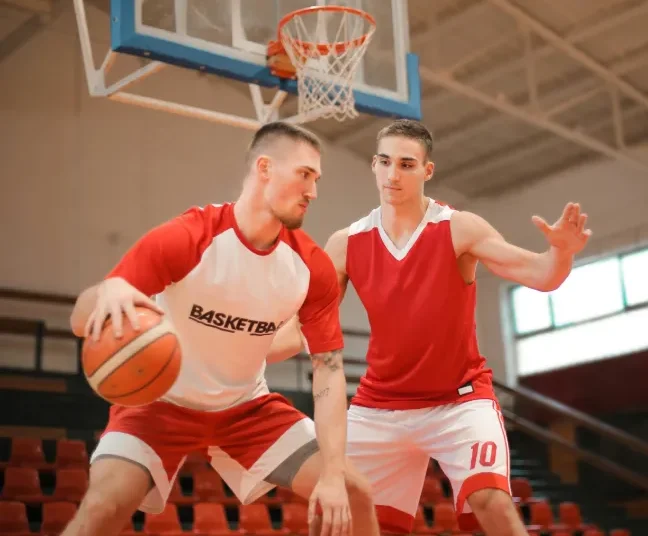Success in basketball isn’t just determined by speed, strength, or shooting ability—it’s also about how well you understand the game. Developing a high basketball IQ helps players anticipate plays, make smarter decisions, and become invaluable teammates. In this guide, we’ll explore strategies that sharpen your mental approach, helping you see the court differently and play with purpose and intelligence.
Why Basketball IQ Matters
A strong basketball IQ gives players an edge that physical skills alone can’t provide. It enables you to analyze defenses, predict your opponent’s moves, and adapt to the game’s flow in real time. Players who understand the “why” behind every play often find themselves in the right spot before anyone else. By studying the game and learning to think strategically, you can transform from a good player into a great one who influences every possession.
Ten Ways to Strengthen Your Game Awareness
1. Watch and Study the Game
Spend time watching professional basketball—not just as a fan, but as a student. Pay attention to how experienced players move without the ball, create space, and react to defensive pressure. Notice their positioning and decision-making in key moments. Reviewing your own game footage is equally important, allowing you to pinpoint habits and identify where you can improve.
2. Seek Guidance from Coaches and Mentors
Coaches and veteran players possess a wealth of knowledge that can fast-track your growth. Ask questions, request feedback, and learn how they analyze plays or make adjustments mid-game. Their insights can help you connect theory with practice, turning general advice into personal improvement.
3. Know Your Team’s System
Understanding your team’s offensive and defensive schemes allows you to make quicker, smarter decisions. Know your teammates’ tendencies, their strengths, and where they prefer to receive the ball. The more familiar you are with team strategy, the easier it is to anticipate movements and exploit defensive gaps.
4. Communicate Effectively
Great teams communicate constantly. Use clear calls, gestures, and eye contact to stay connected on the court. Whether it’s signaling a screen, alerting a teammate about a switch, or calling for the ball, communication builds trust and keeps everyone synchronized.
5. Learn the Rules Inside Out
Knowing the game’s rules gives you an advantage many players overlook. Understanding technicalities like defensive positioning, traveling calls, or clock management can help you make smarter plays. Mastering the finer details also reduces avoidable mistakes and lets you take advantage of specific in-game situations.
6. Practice Decision-Making Under Pressure
Basketball moves fast, and good decisions must be made in seconds. Simulate game conditions in your training—run drills that challenge you to choose between passing, shooting, or driving. The more you expose yourself to real-game pressure, the more instinctive and confident your reactions become.
7. Focus on Defense
Smart defenders change the game. Study how your opponents operate, recognize their favorite moves, and learn to anticipate their next action. Solid defensive awareness not only helps stop scoring opportunities but also creates turnovers that lead to fast-break points for your team.
8. Challenge Yourself Against Stronger Players
Playing against tougher competition pushes you to elevate your game. Higher-level opponents force you to make quicker reads, play with more precision, and adapt to different styles. Each matchup becomes a lesson in resilience and strategy that builds confidence and experience.
9. Use Visualization and Mental Preparation
Before stepping on the court, visualize different scenarios—executing plays, making defensive stops, or knocking down shots under pressure. Mental rehearsal helps condition your mind, improve focus, and reduce anxiety during games. When your mind is calm and prepared, your performance follows.
10. Reflect and Learn After Every Game
After practices or games, take time to analyze your decisions. What worked well? What could you have done differently? Learning from both success and mistakes strengthens your awareness and builds consistency. Reflection transforms experience into growth, shaping you into a smarter, more adaptable player.
Frequently Asked Questions
How long does it take to develop a high basketball IQ?
It varies by player, but steady improvement comes from consistent practice, studying the game, and applying lessons learned. Some players notice progress within months, while others refine their understanding over years of experience. The key is dedication and reflection.
Can watching basketball alone improve my IQ?
Watching games helps you learn patterns and strategies, but real progress comes from combining observation with active play. Applying what you see in real-time game situations deepens understanding and cements new habits.
Should I focus on one position to build basketball IQ?
Specializing in one position helps you master its specific responsibilities, but understanding multiple roles gives you a broader perspective. The best players know how every position contributes to the team’s success.
Does physical conditioning affect basketball IQ?
Yes. A strong, fit body supports a sharp mind. Better conditioning helps you stay alert, react faster, and think clearly under fatigue—all crucial for smart decision-making.
Final Thoughts
Building basketball IQ is a lifelong pursuit. It’s about seeing the game differently—understanding not just what to do, but why. By studying, practicing, and reflecting consistently, you’ll elevate your awareness, improve your performance, and become the kind of player every team needs: one who leads with both skill and intelligence.














